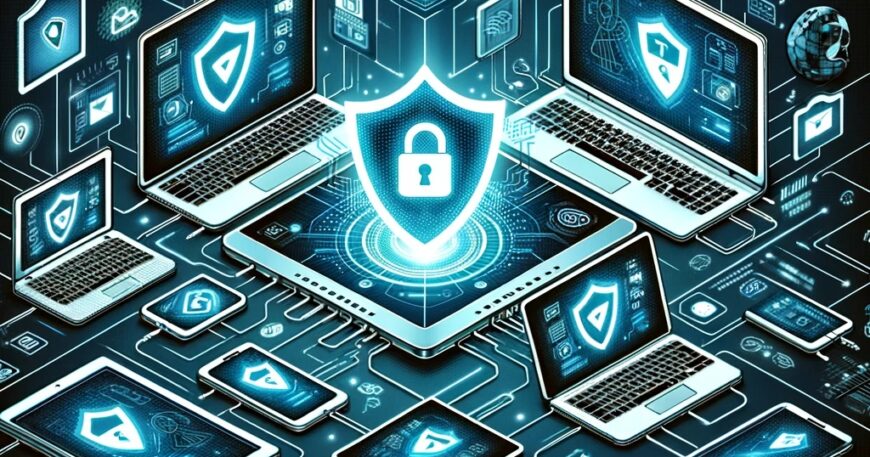Understanding Endpoint Protection: A Modern Cybersecurity Necessity
In today’s digital age, the significance of endpoint protection in maintaining cybersecurity cannot be overstated. As organizations navigate the complexities of protecting sensitive data and systems, understanding, and implementing robust endpoint protection strategies have become paramount. This article delves into what endpoint protection entails, its critical importance in our interconnected world, and how businesses can effectively shield themselves from ever-evolving cyber threats.
What are Endpoints?
Endpoints are devices that connect to a network and communicate back and forth with the network. These can include:
- Computers: Desktops and laptops running various operating systems like Windows, macOS, and Linux.
- Mobile Devices: Smartphones and tablets with connectivity to the internet and corporate networks.
- Servers: Both on-premises and cloud-based servers that store and manage data.
- IoT Devices: Smart gadgets and industrial machines connected to the internet.
What is Endpoint Protection?
Endpoint protection is the cybersecurity process of defending the devices that connect to your network, known as endpoints, from malicious activities. These endpoints include laptops, desktops, smartphones, tablets, servers, and even Internet of Things (IoT) devices. Each of these devices presents a potential entry point for cybercriminals to exploit.
Why is Endpoint Protection Important?
Endpoints are often the target of attacks because they serve as entry points to your network. Hackers can exploit vulnerabilities in software, operating systems, or the human element (e.g., phishing scams) to gain unauthorized access. Once inside, they can steal data, deploy malware, or conduct other malicious activities.
The Evolution of Endpoint Threats
The evolution of cyber threats has necessitated the development of advanced endpoint protection technologies. Gone are the days when simple antivirus software was sufficient. Modern threats require a multifaceted approach, combining traditional malware protection with advanced strategies like machine learning, behavior analysis, and real-time threat intelligence.
Core Components of an Effective Endpoint Protection
Endpoint protection platforms (EPP) are comprehensive security solutions that address various threats. Key components include:
- Antivirus and Anti-malware Protection: The foundational element that scans and removes malicious software. Antivirus scan files and applications to identify and eliminate malicious software.
- Endpoint Detection and Response (EDR): Advanced tools that detect, investigate, neutralize sophisticated threats, and respond to threats that may bypass traditional defenses.
- Email Security: Filters that screens and protects against phishing attempts, spam, malware, and other email-based attacks.
- Firewalls: Gatekeepers that monitor and control the network traffic based on security rules. They control the incoming and outgoing network traffic based on predetermined security rules to block unauthorized access.
- Data Loss Prevention: Technologies that prevent sensitive information from being leaked or stolen.
Why You Need Endpoint Protection
The digital transformation has expanded the attack surface of many organizations, making endpoint protection more crucial than ever. Cyberattacks not only disrupt business operations but can also lead to significant financial losses and damage to an organization’s reputation. Implementing a robust endpoint protection strategy is essential in mitigating these risks.
Best Practices for Implementing Endpoint Protection
- Regular Updates: Keep all endpoint devices and security software up to date to protect against the latest vulnerabilities.
- Comprehensive Security Policies: Develop and enforce policies that cover device management, internet usage, and data security.
- User Training: Train users to recognize threats like phishing and social engineering attacks.
- Regular Backups: Ensure data is backed up regularly to facilitate recovery in case of a cyberattack.
- Multi-Factor Authentication (MFA): Adds an extra layer of security by requiring users to verify their identity in more than one way.
Conclusion
As cyber threats continue to evolve, so too must our approaches to endpoint protection. By understanding the importance of endpoint security and implementing a layered, comprehensive defense strategy, organizations can significantly reduce their vulnerability to cyberattacks. In the end, the goal is not just to protect individual devices but to safeguard the integrity of the entire network and, by extension, the organization itself.
Do you need help with your IT? Cynxt can help! We provide IT Solutions that will provide you a peace of mind. Contact Us today or call (256) 456-5858 to schedule an appointment. We are located at the Shoals Business Incubator in Florence, AL. Let us help you keep your digital life running smoothly!
Cynxt Service Areas:
We proudly serve businesses in the following areas and surrounding cities. Click here to view the full list. Remote support is also available for businesses anywhere.
North Alabama:
- Florence
- Muscle Shoals
- Russellville
- Athens
- Decatur
- Huntsville
Middle Tennessee:
- Franklin
- Columbia
- Lawrenceburg
- Pulaski
About Us:
With over 18 years of IT experience, Cynxt IT Services delivers enterprise-level solutions tailored to small and medium-sized businesses. As a trusted Managed Service Provider (MSP), we’re dedicated to supporting your growth with reliable, expert IT services and unmatched customer care.
Services:
Explore our wide range of IT Services. Learn more about how we can help with your IT needs. Not finding the service you’re looking for? Contact Us to discuss custom solutions.
- Managed IT Services
- Hourly IT Support
- Cybersecurity
- Cloud Services
- Networking
- Network Cabling
- IT Consulting





